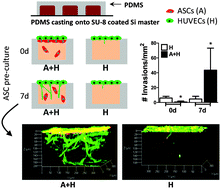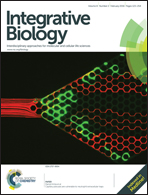Adipose-derived stem cells increase angiogenesis through matrix metalloproteinase-dependent collagen remodeling
Abstract
Adipose-derived stem cells (ASCs) are key regulators of new blood vessel formation and widely investigated for their role in tissue regeneration and tumorigenesis. However, the cellular and molecular mechanisms through which ASCs regulate angiogenesis are not well understood. Here, it was our goal to test the functional contribution of ASC-mediated extracellular matrix (ECM) remodeling on endothelial cell invasion. To isolate the effect of ECM-remodeling, ASCs were embedded within 3-D collagen type I hydrogels and pre-cultured for 7 days; controls were not pre-cultured. A confluent monolayer of human umbilical vein endothelial cells (HUVECs) was seeded on top and its invasion into the underlying hydrogel was analyzed. Without pre-culture, ASCs inhibited vascular sprouting by stabilizing the endothelium. In contrast, 7 day pre-culture of ASCs drastically increased invasion by HUVECs. This effect was largely mediated by proteolytic ECM degradation by ASC-derived matrix metalloproteinases (MMPs) rather than vascular endothelial growth factor (VEGF), as our results indicated that blockade of MMPs, but not VEGF, inhibited endothelial sprouting. Collectively, these data suggest that the angiogenic capability of ASCs is modulated by their proteolytic remodeling of the ECM, opening new avenues for pro- and anti-angiogenic therapies.


 Please wait while we load your content...
Please wait while we load your content...